We’re almost all the way through the first round of games, fans, and it’s hard not to start making pronouncements about this or that team. El Bolso looks at some of the early surprises of Brazil 2014.
We’re not in South Africa anymore, Toto
Spain and Uruguay have both started off on the wrong foot, to say the least. The reigning champions set a record for the worst performance by a holder in history by getting creamed 5-1 by the Netherlands (and it could have been a lot worse), while Uruguay dealt with being placed in the “group of death” by losing what looked like the easiest of their three games, 3-1 to Costa Rica. Have the two biggest stories four years ago lost the magic?
There are several similarities between the two teams’ early failures. Both are coming off the most successful stints in their recent history: Spain is of course the reigning world champeen, and they have won the last two European Cups as well. Uruguay reached the Cup’s final weekend for the first time in 40 years and followed that by winning the 2011 Copa America. Both teams are also a little long in the tooth: Uruguay is the third oldest team in Brazil, while Spain is eighth on that list. Both started off well, taking first half leads on penalty kicks and narrowly missing second goals that may well have led to completely different results. Both faded in the second half, allowing their opponents to dominate and eventually win handily. At least my beloved Celeste can look forward to the return of their best offensive player, although they do have a much tougher road to hoe from here on out. Yes, both teams started slowly last time: Spain lost to Switzerland 1-0, while Uruguay barely managed a scoreless tie with a French team that didn’t make it out of the group stage. Still, both squads have left themselves no room for error.
Look, Argentina and Brazil are old too, and they managed to win their games. Yes, but Argentina also faded down the stretch against Bosnia-Herzegovina, and Brazil may have fallen to Croatia if it weren’t for that magnificent new player they have who looks Japanese and wears black instead of yellow. There’s one other key difference to consider: these other teams are hungry. Brazil needs to win this cup at any cost, while Argentina has gone so long between major trophies (their last one was the 1993 Copa America) that they may not even remember how to organize a proper parade. Spain and Uruguay are both near the end of overachieving golden generations, and both chose to ride their proven studs one last time instead of pushing for new blood. They may both regret that decision in about a week’s time.
The 2014 World Cup, Sponsored by… Cialis?

The moaning over decreased scoring has become a World Cup tradition. Every four years people do some basic math and complain that they just don’t make them like they used to. Never mind that those majestic goal averages of yore were inflated by lack of defensive sophistication and the mismatches that result from filling out a 16 or 24 team and spreading cup spots around the globe to countries that are far behind established powers. Still, none of the first 6 world cups averaged less than 3 goals per match (with Switzerland ‘54 leading the pack at an astounding 5.38 gpm), while no tournament since then has even reached that figure. South Africa 2010 was the second lowest scoring cup ever at 2.27 gpm, barely ahead of the Italy ’90 snooze-fest. As a result, many people are getting excited by the first few days of games in Brazil, where scoring is a feisty 37 goals in 11 games through Sunday (that’s 3.36 per game); four years ago it took 20 matches to see that many goals. There’s been only one game with less than three goals scored (Mexico-Cameroon), whereas last time around the first 11 games featured only one that even reached that many (Germany’s 4-0 trouncing of Australia). So are we looking at a soccer revolution? Well, it’s only a few games, but so far teams have looked more dynamic and forward-focused than I remember in previous cups. Hopefully they can keep up the pace and give the world a show over the next four weeks.
- The Charrúa Report: On the Right Foot - March 14, 2017
- The Charrúa Report: Campeones! - February 14, 2017
- The Charrúa Report: 48 Is Enough - January 11, 2017
- The Charrúa Report: Nico and the Sounders - December 14, 2016
- The Charrúa Report: King of the Single Rounders - December 12, 2016
- The Charrúa Report: Senseless - December 6, 2016
- The Charrúa Report: The Bum’s Rush - November 28, 2016
- The Charrúa Report: A Bump in the Road - November 16, 2016
- The Charrúa Report: Is It Priceline Time? - November 12, 2016
- The Charrúa Report: Closer to Fine - October 13, 2016

